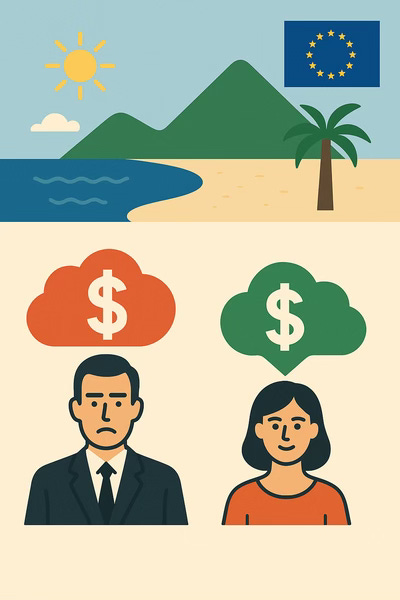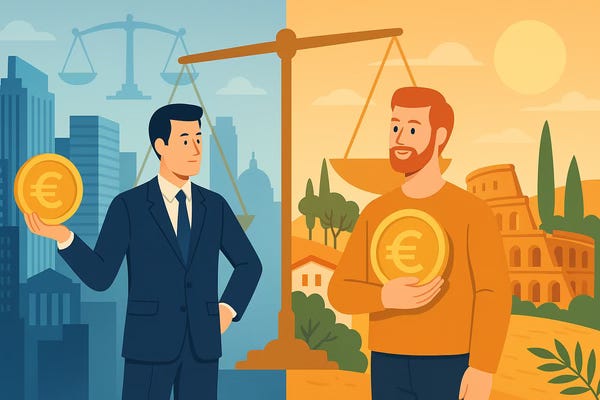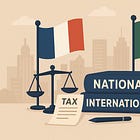Why I Feel Freer in a Monarchy Than in My Democratic Home Country
Reflections on Dubai and the freedom granted by digital nomadism
Note : This article is the 1st in a series on how to significantly reduce your tax bill and maximize your freedom by moving abroad. Here are the first articles in the series :
If I told you that you could live in sunny countries, offering sea and mountains, with a thousand-year-old culture, incredible food, and that are in the European Union, you'd probably say to me "OK, that sounds great, but I'm going to have to pay a lot of tax, are we agreed?"
And... you'd be both right and wrong.
Right, because the standard rate in these countries is very high indeed.
Wrong, because you're assuming that this standard rate will apply to you, while many countries are struggling to attract talent.
This is because governments have long had two major conflicting motivations: they want to 1) tax their citizens as much as possible, while 2) attract foreign talent and investors, who are driven away by excessive taxation.
So, how do we resolve this dilemma?
Simple: all you have to do is be schizophrenic...
In other words, offer a lower tax rate to immigrants than to your traditional residents.
And the lower your tax rate, the more likely you are to attract newcomers.
Many countries in Europe, but also in the rest of the world, offer regimes of this type.
In this series, I'll take you through a few of them, to show you the possibilities, but above all 1) consult a tax lawyer who specializes in this field if you're thinking of moving abroad, and 2) understand that some things may have changed between the time I wrote these words and the time you're reading them.
But first...
The paradox of an authoritarian country where nomads feel freer
I left my native France in 2015, living first for three years in London before settling in Dubai, a city I love and where I see myself staying for at least a few more years.
At this point in your reading, you may be thinking: "But Olivier, throughout this Substack and your book, you've presented us with all this evidence showing that states are increasingly engaging in mass surveillance, and the dangers this poses to the fundamental principles of democracies, as well as to their legitimacy. Isn't it paradoxical that you should praise Dubai, which is not a democracy, and which probably monitors its population, notably with its omnipresent cameras coupled with facial recognition?"
That's an excellent question.
And answering it will enable me to outline several of the often unsuspected benefits of expatriation.
For several years now, I haven't even needed to show my passport or resident card at Dubai airport, either on arrival or departure: I go through a door in which a camera takes my photo... then, a few seconds later, my first name and surname appear on the screen, and the door opens automatically.
A very practical system.
But it just goes to show how easy it is today for governments to use facial recognition technologies to track our movements.
The Emirati government has the power to know the movements of all its residents, as cameras are ubiquitous in Dubai, and really used by the police (unlike in London, for example).
As a result, it's common knowledge that there's no point in stealing a car in Dubai: as soon as you file a complaint with the police, all they have to do is type in the license plate number to find out immediately where the car is, as well as the entire route it has taken1.
If it's possible to know where any car is, make no mistake: it's also now possible to know where any individual is, and what route they've taken.
It's also clear that the United Arab Emirates, with its monarchical system, doesn't offer the same political freedoms as Western democracies.
So, does this not bother me, who speaks out so strongly against mass surveillance?
The answer is, yes, it does.
But, paradoxically, much less than if I lived in my native country, which is nonetheless a democracy.
Why is this?
There are two main reasons.
1st reason: a better balance of power between the individual and the state
A different implicit contract
Firstly, there is a different implicit contract between an individual who lives in a country because he was born there, and an individual who lives in a country he has chosen because it offers him the best value for money in a market of jurisdictions.
The former, often a mono-country person, is in a sense stuck in his own country. Not that he has no right to escape (although this may be the case in some countries, and others demand exit taxes to let you leave), but simply that there is so much inertia to leaving, linked to habits, language, friendships and social relationships, etc., that his country is a kind of black hole that inexorably attracts him, or rather a giant planet with inordinate gravity that requires a lot of energy to escape.
As an immobile monocountry, he feels the crushing weight of the state on his shoulders, and every authoritarian law, every weakening of a fundamental freedom, can have major consequences on his life.
The second case is very different - the individual arrives in this country not only as a customer, but also as a nomad. As soon as he no longer likes the services he receives, or the value for money no longer suits him, or certain criteria (such as surveillance) become too onerous, he can leave - and not only can, but should.
This leads to a fundamentally different equilibrium, because in this configuration, the individual has significant power over the state that balances the significant power the state has over him: he can freely choose which state to live in and contribute to, in a market of jurisdictions that compete and vie to attract him and convince him to stay.
So I know, to put it bluntly, that if one day Dubai gives me the shits, I'm out of here.
It's a possibility that's intrinsically part of the implicit contract that binds me to this place, and as it gives me a great deal of power in relation to Dubai, I'm prepared in return to accept that Dubai has a little more theoretical power over me than a democratic society.
After all, voting with your feet balances the balance of power between individuals and the state far better than voting at all.
This is an important element to understand when you're choosing your first expatriate country.
Take yourself for granted or respect yourself for what you bring?
You should also know that the country that will always value you least is the one where you were born. It's a trait of human nature: we value less what we already have.
And yet your country takes you for granted, while dozens are fighting to attract you, especially if you're an entrepreneur or a recognized figure in your field, but not only.
Being more desired in a country to which you immigrate by bringing value weighs in the scales in your favor, and balances a little more power between you and the state of the country you've chosen compared to the country where you were born.
Not that this gives you the right to do illegal things, of course, but it often ensures you more leniency, and sometimes even rights, from the authorities.
Because, as we've seen, countries want to tax their citizens as much as possible, while at the same time attracting talent and investors. Many of them therefore resort to real double standards to resolve this schizophrenia: that of offering a more attractive tax regime to foreigners than to their own citizens.
Take Italy, for example, which regularly tops the list of the world's highest-taxed countries.
But this applies to Italian citizens.
If you're a foreigner looking to set up home in one of the many countries that are opening their arms to you, Italy would very much like to see you come here rather than elsewhere.
On the downside, even though the country has many assets, such as its climate, cuisine and history, it has one of the worst tax rates in the world, which isn't very attractive. However, lowering it would reduce tax revenues too much, which isn't such a good idea given the deficit Italy runs every year in its budget, and the size of its debt, which, at the time of writing, is well over 100% of its GDP 2.
But fear not, the Italian government has thought of everything, with the status of "Lavoratori impatriati" ("impatriate workers").
Judge for yourself: this scheme offers its beneficiaries a 70% tax reduction on Italian-source income, and even a 90% reduction if they settle in certain southern provinces3 (which are experiencing economic problems)! And this also applies to entrepreneurs setting up their own business!
These exemptions are valid for five years, but can be renewed for a further five if you have a child under the age of 18, or if you have bought a house in the twelve months preceding or following your arrival in Italy.
There are several criteria to qualify for this status, the most important of which is that you must not have been a tax resident in Italy for the last two years (de facto excluding all Italian citizens living in their own country).
Two other schemes are also very interesting:
· If you are retired and come to live in Italy, you will be taxed at only 7% on your foreign-source income, including your pension.
To qualify, you must not have been a tax resident in Italy for the last five years.
You can benefit from this regime for ten years
· You can opt for a "flat tax" of 200,000 euros a year4 , which will be the only tax you pay: if you earn, say, one million euros a year, your tax rate will be 20%. It's a highly advantageous system for the wealthy.
For the latter, you must not have been an Italian tax resident for nine of the last ten years.
You can benefit from this regime for fifteen years.
Is this unfair to Italian citizens? Clearly. Is it smart from the point of view of the country's economy, which attracts many talented people thanks to these systems? Clearly so.
In any case, this is an example of a country that takes its citizens for granted, and goes out of its way to attract foreigners. And there are many examples like this, some of which we'll see later.
A somewhat taboo benefit...
And that's not all: there's another benefit foreigners get from moving to a new country with this kind of status.
It's an unofficial, informal, hidden and even somewhat taboo benefit, and one that would be immediately denied by any government official, lawyer or other professional involved who were interviewed on television... but not necessarily in a private conversation held away from prying ears.
This benefit is that the host state is much less motivated to ensure that foreigners who come to its soil bringing value are completely within the law, as long as they're not doing anything blatantly illegal and contributing in some way to the economy, than the citizens of that country.
Because the state knows that, if it is too strict in interpreting the rules and creates too much friction, then some of those foreigners it has had so much trouble getting to come to it will leave, and any gain it has made from applying the law too rigorously will have been temporary and will only result in a greater loss in the long term.
Just take a look at the specialized forums, where users can testify anonymously, and you'll see, for example, that tax audits of people benefiting from NHR status in Portugal5 are extremely rare, if not non-existent.
This is not to say that the beneficiaries of this status are completely above the law, or that they can do as they please and pay no taxes. It simply means that the Portuguese government is less motivated to control them, because it knows that between it and these special residents, the balance is tipped in favor of the residents, compared to "classic" citizens.
And so, some rather "acrobatic" schemes are passed off, when they wouldn't be for Portuguese citizens, simply because, once again, as long as these residents aren't doing anything blatantly illegal and they're contributing to the country's economy, it's a net gain for Portugal - because if these same residents left for Italy, Greece or Dubai, they'd bring in absolutely zero.
Note that even if you're 100% square and follow the law scrupulously, this also represents an advantage: the simple fact of being less exposed to a tax audit is worthwhile, as it's one of the most dreaded and stressful events for entrepreneurs, as well as being a considerable waste of time and energy (and seeing a tax inspector turn up isn't likely to make you feel like a customer who has freely chosen the jurisdiction with the best value for money).
Is this unfair? Again, yes. Does it make sense, pragmatically, to strengthen a country's attractiveness in a market of fiercely competitive jurisdictions? Again, yes, it does.
2nd reason : a smaller exchange surface with the state
When you leave a democratic country to live in one that isn't, you generally expect to be less free.
But why? If we think about it, we may come to the conclusion that it's because we expect to be under greater pressure from the authorities, limiting our freedoms.
Yet this is completely the opposite of my experience as a resident of Dubai: I feel freer there than in my native country.
Why is that?
Partly because of the smaller surface area for exchanges with government institutions, which we don't necessarily think of when we think of a democracy, but which are nonetheless omnipresent and place a heavy burden on the shoulders of the population, and in particular entrepreneurs:
Tax authorities
Fraud control
Data protection authorities, such as the CNIL in France
Etc.
All these authorities have considerable powers of control and coercion, and in some cases, like the tax authorities, immense.
But when you move to a new country, you considerably reduce your exchange surface with these institutions in your country of departure, which often no longer have jurisdiction, or much less so, which reduces their powers accordingly.
"Great", you might say, "but then we increase our surface area of exchanges with the institutions of the country we're moving to, so it's the same thing, and even worse if we go to a non-democratic country, isn't it?"
In theory, yes. But in the overwhelming majority of cases, the institutions in the country you're moving to aren't as interested in you as those in your country of departure, as we've just seen. And this is particularly true if you're moving to a country whose language is different from that of your business.
Because often, what prompts one of the agencies mentioned above to take an interest in you is stumbling across what you do online, or receiving a complaint or even a denunciation from a customer, supplier or employee.
What are the chances of this happening in a country that doesn't speak the language in which you do business?
Of course, it's a godsend for fraudsters - as I said in this series, the Internet makes it easier for fraudsters and more difficult for nation-states - and it often enables absolutely shameful and deplorable scams.
But it's also a godsend for honest entrepreneurs, who can focus 100% on their mission, free from the weight of these institutions that can be experienced as veritable swords of Damocles, and occupy a considerable amount of bandwidth in their minds.
This provides a considerable sense of freedom, reinforced in Dubai by the absence, for a long time, of personal and corporate taxes for businesses set up in one of the Free Zones.
This meant there was effectively no interaction with the UAE tax authorities, which was incredibly liberating.
This has now changed, with the introduction of a 9% corporate income tax. But this tax is still one of the lowest in the world, and there is still no tax on income, capital gains, etc.
On the other hand, as entrepreneurs, we don't generally go out into the streets to demand help from the government: if we ask anything of the government, it's to get out of our way and let us create our own reality in the best possible environment.
In this respect, Dubai, monarchy that it is, is a paradise for entrepreneurs.
Of course, I'm not saying that all non-democratic systems are necessarily neutral from this point of view and will give you as much freedom to build your business as you like.
What I'm saying is that nomadism offers such freedom that it transcends the intrinsic lack of freedom of non-democratic systems in many cases, because it ultimately allows you to become more sovereign than the average person.
This sovereignty is a power that comes directly from the Leviathan-Network, and is transmitted to you via your mobility. And you take this sovereignty with you wherever you go: it's a portable sovereignty. In fact, you're a kind of semi-autonomous entity.
This gives you a better balance of power between you and the state than the native citizens of the countries where you live.
And if this sovereignty is a good counterweight to the power of the Dubai government, it is also an excellent counterweight to any democratic government that becomes progressively more authoritarian.
Coming soon
In the next article, we’ll do a deep dive into international taxation and how it works.
Stay tuned ! In the meantime, feel free to follow Disruptive Horizons on X/Twitter & Linkedin, and join the tribe of Intelligent Rebels by subscribing to the newsletter :
And here are the first articles of this series :
This was brought to my attention by a friend, whom we'll call Jean, who... lost his car! When he went to the police station to lodge a complaint, the officer laughed and told him: "It's impossible to steal a car in Dubai! What's your license plate number? Jean gave the number, which the officer typed into his keyboard. Then he turned the screen towards my friend and said: "You see, your car is currently parked in this area. Are you sure you didn't leave it there? My friend then realized that it was probably his girlfriend who had dropped someone off there by borrowing his car... which was confirmed with a simple call.
137.3% exactly, " Italy 2023 budget deficit overshoots but debt still falls ", Reuters, 2024.
"Tax relief for workers relocating to Italy ("lavoratori impatriati")", University of Bologna, 2024. This flat tax was €100,000 per year until August 2024.
And €25,000 per additional family member if you want them to benefit from this regime - it's not compulsory.
"Non Habitual Resident", a status similar to the Italian one, which was active from 2009 to 2023. People who have obtained this status have it for 10 years: its termination in 2024 is only valid for new residents. Another example of a "good deal" that's gone: in this field as in many others, you have to seize the bargains when they come along!














Amazing article, Olivier. I 100% agree.
Article passionnant qui laisse à réfléchir sur l'expatriation. Merci!